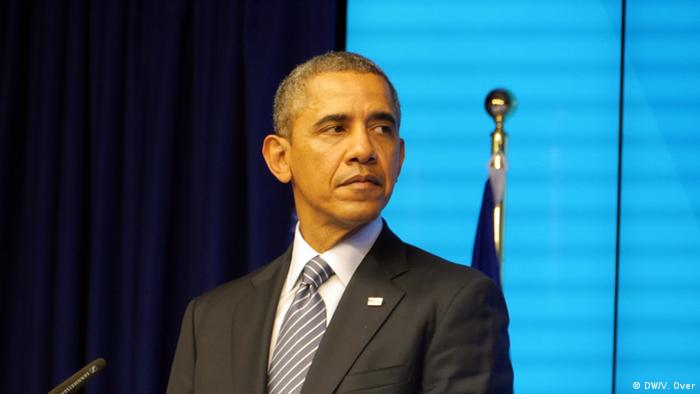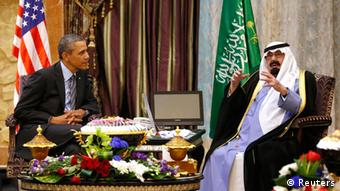Welcome
....to JusticeGhana Group

JusticeGhana is a Non-Governmental [and-not-for- profit] Organization (NGO) with a strong belief in Justice, Security and Progress....” More Details
Opinion: Obama's obfuscation needlessly confuses allies
- Details
- Parent Category: Africa and The World
- Category: Current Issues
- Created on Sunday, 30 March 2014 00:00
- Hits: 7985
 Opinion: Obama's obfuscation needlessly confuses allies
Opinion: Obama's obfuscation needlessly confuses allies
Rhetoric backed with little substance from US President Barack Obama pleased Europeans but disappointed Saudi Arabia's leaders. Allies would be less confused if Obama let out his hidden realist, says John C. Hulsman.
For my sins, I have written 86 articles on the foreign policy of US President Barack Obama. Over time - much as a batter in baseball figures out an opposing pitcher by their last time up - I have divined the president's rhetorical playbook. And trust me, it never changes. This is an orator who is very good in a set-piece environment that he controls - his regard for teleprompters is legendary - but he is far less good at speaking off the cuff. The president's rhetorical pattern is truly set in stone.
The playbook goes something like this: The president carefully constructs a straw-man opponent, at first rather precisely describing them - which is a facet of his work that gives him instant credibility. However, he then assesses the key elements of their arguments in a remarkably simplistic manner, seemingly striking down his opponent's world view with a single blow. Having accomplished this Herculean feat, he indulges in expansive rhetoric, pleasing and almost wholly devoid of policy substance - describing a world that has never existed, pretending the new age is just around the corner, if we only will it into being - the notion of "hope" being crucial here.
As an admirer of Orwell, I have always been distrustful of the president's approach, well aware that a multitude of sins can be hidden by such a rhetorical sleight of hand. In the longer run, confusing people merely angers them, and hard-won credibility is squandered.
A foreign policy variation on the theme
This deliberately opaque all-things-to-all-men approach explains both why the president's trip to Europe has been a general success and his visit to Saudi Arabia ends as a qualified failure.
 In the case of the president's primary European address, the straw man was realism. First, President Obama smartly made the point that realists do not feel that significant involvement makes a lot of sense in Ukraine. He then turned on a dime, refuted that as an archaic view of the world, and proceeded to talk expansively about the storied past of NATO, and that the United States would not turn its back on Europe.
In the case of the president's primary European address, the straw man was realism. First, President Obama smartly made the point that realists do not feel that significant involvement makes a lot of sense in Ukraine. He then turned on a dime, refuted that as an archaic view of the world, and proceeded to talk expansively about the storied past of NATO, and that the United States would not turn its back on Europe.
Yet almost no leading American neo-cons, Wilsonians, or realists would have argued with any of this. However, the crucial fact is that while the president talks like a Wilsonian about Ukraine and much else besides, more often than not he has acted like the realists he denigrates. The day before his speech, Obama sensibly said exactly what he should have at the beginning of all this: Due to Article V, America will fight for its NATO allies. However, it will not do so for non-NATO European countries. The arch-realist George Kennan himself could not have drawn a clearer or more credible line for Russian President Vladimir Putin. For all his talk of not forgetting Europe, here was a president prepared to live in the real, imperfect world we actually inhabit, not seeing all European states as equal, and basing such a grounded view correctly on the notion of American national interests.
As ever, his European performance was wholly intellectually confusing. But also as ever, it serves a very concrete tactical purpose. The president may be a closet realist, but his supporters in the Democratic Party are not; the mainstream remains resolutely Wilsonian. While the president knows better, he throws rhetorical meat to the base, always making sure not to cross its Wilsonian impulses too overtly, or too directly. Given the looming mid-terms and Obama's sagging poll numbers, the last thing the White House needs is a domestic fight with his dwindling band of supporters.
Fortunately for the president, his contortions between rhetoric and reality suited his European hosts. Ironically, they want to sound principled while not risking too much either, due to their dependence on Russian gas and links to the Russian economy. Pivotal Germany gets over 30 percent of its gas from Moscow, and a whopping 300,000 jobs are directly dependent on German-Russian trade. As such, President Obama's pleasing if vague rhetoric can be bought into, while concrete realities mean that not much of anything will be done about non-NATO European states.
The Saudi counter-example
 If the Europe trip went right because of shared transatlantic tensions between Wilsonian rhetoric betrayed by realist facts on the ground, the same dynamic ruined the follow-up: Obama's brief visit to King Abdullah of Saudi Arabia. The Saudis, perhaps not quite as practiced in rhetorical acts of misdirection as the White House, have actually had the nerve to hold the president accountable for what he has said - contrasting it with what he has done - and found him wanting.
If the Europe trip went right because of shared transatlantic tensions between Wilsonian rhetoric betrayed by realist facts on the ground, the same dynamic ruined the follow-up: Obama's brief visit to King Abdullah of Saudi Arabia. The Saudis, perhaps not quite as practiced in rhetorical acts of misdirection as the White House, have actually had the nerve to hold the president accountable for what he has said - contrasting it with what he has done - and found him wanting.
King Abdullah has never gotten over the fact that after drawing a red line in Syria, the president scurried away from it as soon as he possibly could. Nothing that is happening in Syria, grim as it has been, is worth America getting involved in yet another land war in the Middle East. Just as in Ukraine, I entirely agree with what the president has done; however, like King Abdullah, I am dismayed with the misleading rhetoric that accompanied it, as it has needlessly alienated a central ally in the Middle East.
For all that we disagree with the king over, including Egypt, the Arab Spring, Bahrain, Syria and Iran, there is much to be done with Riyadh over the vital issues of maintaining a stable price and supply of oil and counter-terrorism. A less furtive realist approach would almost certainly have worked better. However, to do that would be to admit the world is as it is, and then strive to make it better from there. Sadly, given his hidden realism, that is just not a part of the Obama team's playbook.
John C. Hulsman is a Germany-based political scientist, who heads John C. Hulsman Enterprises, a global risk consulting firm. He was also an Alfred von Oppenheim Scholar in Residence at the German Council on Foreign Relations in Berlin.
Date 28.03.2014
Author John C. Hulsman
Editor Sean Sinico, Emily Sherwin
Source: Deutsche Welle





